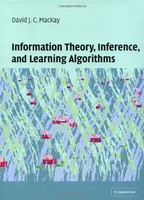
|
FreeComputerBooks.com
Links to Free Computer, Mathematics, Technical Books all over the World
|
|
- Title: Information Theory, Inference and Learning Algorithms
- Author(s) David J. C. MacKay
- Publisher: Cambridge University Press, 1st Ed. (October 6, 2003); eBook (4th printing, March 2005)
- Hardcover/Paperback: 640 pages
- eBook: Multiple Formats: Postscript, PDF, DJVU, etc.
- Language: English
- ISBN-10/ASIN: 0521642981
- ISBN-13: 978-0521642989
- Share This:

|
Information Theory and Inference, often taught separately, are here united in one entertaining textbook. These topics lie at the heart of many exciting areas of contemporary science and engineering - communication, signal processing, data mining, machine learning, pattern recognition, computational neuroscience, bioinformatics, and cryptography. financial engineering, and machine learning.
This textbook introduces Information theory in tandem with applications. Information theory is taught alongside practical communication systems, such as arithmetic coding for data compression and sparse-graph codes for error-correction.
A toolbox of inference techniques, including message-passing algorithms, Monte Carlo methods, and variational approximations, are developed alongside applications of these tools to clustering, convolutional codes, independent component analysis, and neural networks.
About the Authors- David J. C. MacKay was a British physicist, mathematician, and academic.
- Information Theory and Systems
- Machine Learning
- Algorithms and Data Structures
- Combinatorics and Game Theory
- Discrete and Finite Mathematics
- Operations Research and Optimization
- Computational Complexity

- Information Theory, Inference and Learning Algorithms (David J. C. MacKay)
- The Mirror Site (1) - PDF
-
 Information Theory for Data Science (Changho Suh)
Information Theory for Data Science (Changho Suh)
This book aims at demonstrating modern roles of Information Theory in a widening array of data science applications, focuses on applications that arise in data science, including social networks, ranking, and machine learning.
-
 Information Theory and Network Coding (Raymond W. Yeung)
Information Theory and Network Coding (Raymond W. Yeung)
Provide a rigorous treatment of information theory for discrete and continuous systems and a comprehensive treatment of Network Coding theory with detailed discussions on linear network codes, convolutional network codes, and multi-source network coding.
-
 An Introduction to Machine Learning Interpretability
An Introduction to Machine Learning Interpretability
Understanding and trusting models and their results is a hallmark of good science. Get an applied perspective on how this applies to machine learning, including fairness, accountability, transparency, and explainable AI.
-
 Hyperparameter Tuning for Machine Learning: A Practical Guide
Hyperparameter Tuning for Machine Learning: A Practical Guide
This open access book provides a wealth of hands-on examples that illustrate how hyperparameter tuning can be applied in practice and gives deep insights into the working mechanisms of machine learning (ML) and deep learning (DL) methods.
-
 Approaching (Almost) Any Machine Learning Problem
Approaching (Almost) Any Machine Learning Problem
This book is for people who have some theoretical knowledge of machine learning and deep learning and want to dive into applied machine learning. The book is best enjoyed with a cup of coffee and a laptop/workstation where you can code along.
-
 An Introduction to Quantum Machine Learning for Engineers
An Introduction to Quantum Machine Learning for Engineers
This book provides a self-contained introduction to Quantum Machine Learning for an audience of engineers with a background in probability and linear algebra, describes the necessary background, concepts, and tools, covers parametrized quantum circuits, etc.
-
 Mathematics for Machine Learning (Marc P. Deisenroth, et al.)
Mathematics for Machine Learning (Marc P. Deisenroth, et al.)
This self contained textbook bridges the gap between mathematical and machine learning texts, introducing the mathematical concepts with a minimum of prerequisites. It provides a beautiful exposition of the mathematics underpinning modern machine learning.
-
 Metalearning: Applications to Automated Machine Learning
Metalearning: Applications to Automated Machine Learning
This book offers a comprehensive and thorough introduction to almost all aspects of metalearning and Automated Machine Learning (AutoML). It can help developers to develop systems that can improve themselves through experience.
-
 The Big Book of Machine Learning Use Cases
The Big Book of Machine Learning Use Cases
This how-to reference guide provides everything you need - including code samples and notebooks - to start putting Machine Learning to work. It's a collection of technical blogs from industry thought leaders with practical use cases you can leverage today.
-
 Convex Optimization for Machine Learning (Changho Suh)
Convex Optimization for Machine Learning (Changho Suh)
This book covers an introduction to convex optimization, one of the powerful and tractable optimization problems that can be efficiently solved on a computer. The goal is to help develop a sense of what convex optimization is, and how it can be used.
-
 Pen and Paper Exercises in Machine Learning (Michael Gutmann)
Pen and Paper Exercises in Machine Learning (Michael Gutmann)
This is a collection of (mostly) pen-and-paper exercises in machine learning. The author assumes basic calculus, linear algebra, probability and statistics but no prior exposure to machine learning.
-
 Interpretable Machine Learning: Black Box Models Explainable
Interpretable Machine Learning: Black Box Models Explainable
This book explains to you how to make (supervised) machine learning models interpretable. The book focuses on machine learning models for tabular data (also called relational or structured data) and less on computer vision and NLP tasks.
-
 Machine Learning with Neural Networks (Bernhard Mehlig)
Machine Learning with Neural Networks (Bernhard Mehlig)
This modern and self-contained book offers a clear and accessible introduction to the important topic of machine learning with neural networks. It provides comprehensive coverage of neural networks, their evolution, their structure, their applications, etc.
|
:
|
|
 |
|
 |
|
 |
|
 |
|
 |
|
 |
|
 |
|
 |
|
 |
|
 |
|
 |
|
 |
|
 |
|
 |
|
 |
|
 |
|




